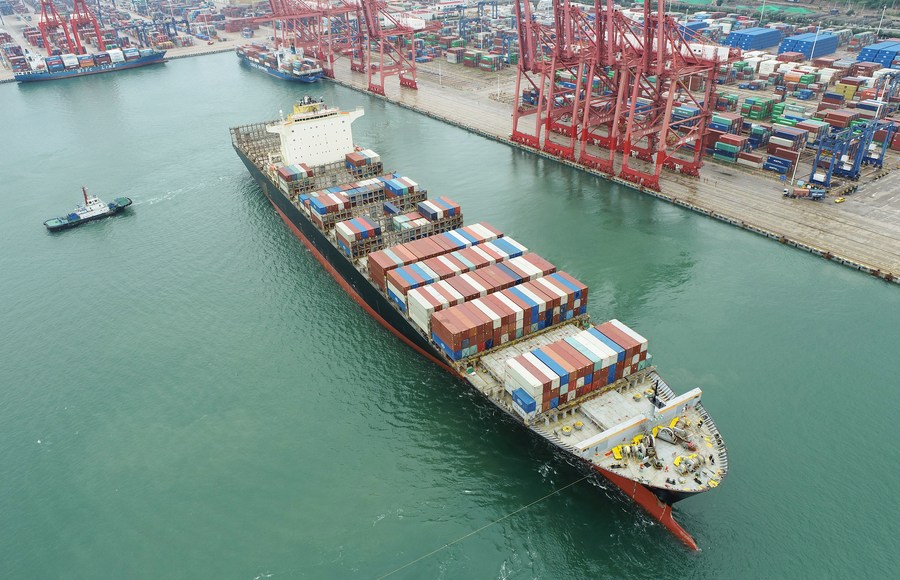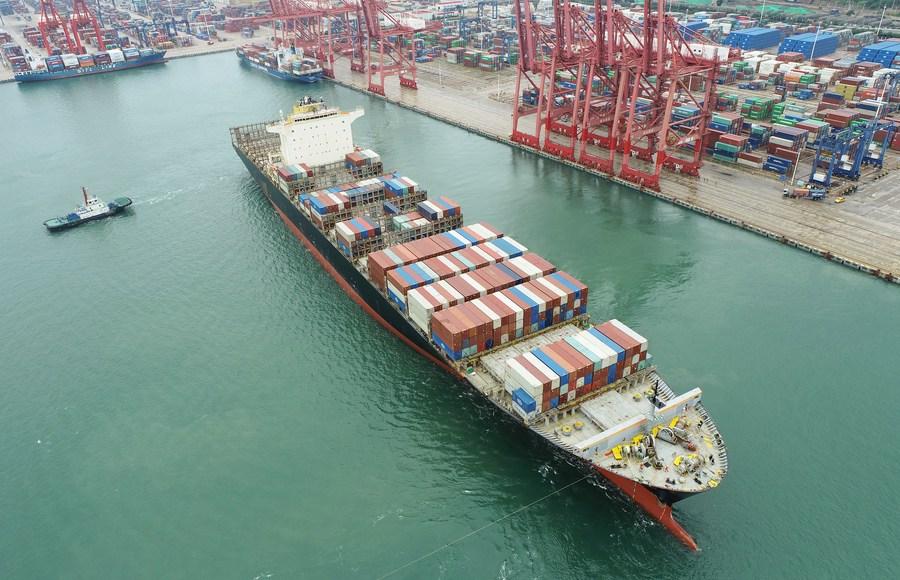
Aerial photo taken on July 13, 2021 shows a loaded ship leaving a container terminal in Lianyungang, east China's Jiangsu Province. (Photo by Wang Jianmin/Xinhua)
BEIJING, March 3 (Xinhua) -- As China's economy maintained sound development momentum in the last year, stabilizing economic growth in 2022 has become a hot issue among China's economic development planning.
Experts say that Chinese economy will sail forward with stable growth momentum in 2022 despite challenges and uncertainties amid the COVID-19 pandemic.
-- An expected growth target of 5.5 percent
According to the latest statistics from the National Bureau of Statistics (NBS), in 2021, China's GDP hit a new record of 114.367 trillion yuan. However, Chinese economy faces pressures at home and abroad such as shrinking demand and supply shortages, which drives China's policy leaning toward guaranteeing a stable economic growth.
The expected annual economic growth rate may be set at around 5.5 percent with an attempt to guarantee employment and guard against risks, said Wen Bin, chief researcher with China Minsheng Bank.
By now, a total of 29 provinces in China have respectively set their economic growth rate at around or above 5.5 percent this year in the local planning, and China is expected to set 5.5 percent as the national GDP annual growth target, said Sun Fu, an analyst with Huaxi Securities.
-- Focus on expanding domestic demand
To achieve economic growth of around 5.5 percent, expanding domestic demand is likely to be the priority of steady growth.
The investment is to play a pivotal role in this aspect, within which infrastructure investment will be conducted ahead of schedule in 2022 in a bid to push forward the construction of key projects and infrastructure during the 14th Five-Year Plan period (2021-2025).
Since the beginning of this year, many local governments released the lists of key projects in 2022, with a total planned investment volume exceeding 6 trillion yuan, according to Sun.
Policies and guidelines will be formulated to guarantee the supply and promote the construction of key projects so as to achieve substantial results, said an official with the National Development and Reform Commission.
In addition, consumption is another driving force for stabilizing China's economic growth in 2022, especially consumption in sectors such as automobiles, home appliances, and rural consumption, said Luo Zhiheng, an expert with Yuekai Securities.
Many provinces proposed to boost commodity consumption such as new energy vehicles and green home appliances as well as service consumption including hotel and catering business, information communication, culture and tourism, sports and health care, etc.
Policies will support the development of livestreaming e-commerce, smart retail, night-time economy, immersive consumption, etc., and stimulate consumers' demand by improving commercial facilities for urban communities, holding shopping festivals, providing consumption coupons and so on.
--Macro policies will be formulated accordingly
Steady and sound economic development momentum also relies on stronger and coordinated macro policies such as monetary policy and fiscal policy.
"In 2022, the fiscal policy will be a growth engine for stable economic growth that relies more on special bonds", Yan Se, an expert with Peking University predicted the scale of special bonds this year will be roughly the same as the previous year flowing towards both old and new infrastructure.
It is also noted that a majority of special bonds will probably be issued in the first half of this year with a tightened schedule, Yan added.
At the same time, the budget deficit will be moderately reduced this year as the COVID-19 pandemic is under good control in China.
With respect to the monetary policy, more efforts should be stepped up in lowering the deposit reserve rate, lowering the interest rate to cut down the cost of banking capital as well as preventing excessive appreciation of the Renminbi, Wen said.
The monetary policy could also better serve micro- and small-sized enterprises, agriculture, and carbon neutrality, etc.
Fiscal policy and monetary policy should be better coordinated in 2022. In terms of investment, related department can appropriately lower the capital ratio of investment projects related to people's livelihood and new infrastructure, so as to provide more abundant funds for infrastructure construction and solve the asset shortage pressure faced by commercial banks at present, according to the experts.
(Edited by Tian Shenyoujia with Xinhua Silk Road, tianshenyoga0524@163.com)




 A single purchase
A single purchase









